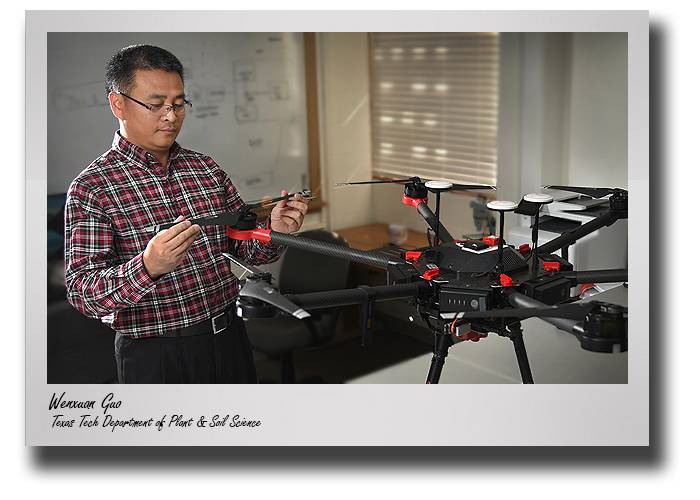Texas Tech earns 'Top 25' ranking for its efforts in precision agriculture
By: George Watson
 Through its research within Texas Tech University and with industry partners, the
College of Agricultural Sciences & Natural Resources remains on the cutting edge of
technology and practices that revolutionize the farming and ranching communities.
That effort earned high praise recently as the Department of Plant and Soil Science
earned a prestigious ranking as one of the 25 best colleges in the world for precision
agriculture.
Through its research within Texas Tech University and with industry partners, the
College of Agricultural Sciences & Natural Resources remains on the cutting edge of
technology and practices that revolutionize the farming and ranching communities.
That effort earned high praise recently as the Department of Plant and Soil Science
earned a prestigious ranking as one of the 25 best colleges in the world for precision
agriculture.
The ranking, by the website for Precision Ag Professional magazine, a worldwide leader in precision agriculture information and analysis, is based on feedback from industry experts and internet research, as well as a self-assessment and peer review by the heads of other programs. Those assessments listed schools considered to have the best reputation in education, research and extension and outreach for precision agriculture.
Among the top 25, Texas Tech is the only non-land grant university in the United States to earn a ranking. A land-grant university is one designated by a state to receive benefits from the Morrill Acts of 1862 and 1890, which funds universities by granting federally controlled land to the states with a focus on teaching agriculture, science, military science and engineering.
"Precision agriculture is about doing everything right, applying the right resource or management with the right amount at the right place, at the right time and in the right manner," said Wenxuan Guo, assistant professor of crop ecophysiology and precision agriculture in the Department of Plant and Soil Science. "Precision agriculture helps improve farming profitability, increase sustainability and protect the environment."
Precision agriculture is a method of farm management based on observing, measuring and responding to variability of crops and soil in order to develop a system for management of the whole farm designed to optimize returns and preserve resources.
Precision Ag commended Texas Tech's precision agriculture program under Guo's leadership. They praised Texas Tech's efforts to develop and expand innovative research and education programs focused on important local and national agricultural needs and to support the state's and nation's economic development through education and research.
"The potential of precision agriculture to improve agricultural productivity is tremendous," said Eric Hequet, Horn Professor and Chairman of the Department of Plant and Soil Science. "More efforts in research, education and service are needed to promote and implement this technology."
Guo has done extensive work using unmanned aerial vehicles (UAV), or drones, to conduct research in plant and soil science. His research focuses on precision agriculture, environmental sciences and remote sensing in agriculture, using UAVs in precision plant phenotyping. His hope is to establish interdisciplinary research and teaching programs using technology to improve production with limited resources, especially the most vital and scarce resource on the South Plains – water.
"Unmanned aerial systems with various sensors onboard can substantially improve agricultural productivity through close monitoring of crop growth with high-resolution images," Guo said.
CONTACT: Eric Hequet, Department Chair, Department of Plant and Soil Science, Texas Tech University at (806) 742-2838 or eric.hequet@ttu.edu
0410NM18
Davis College NewsCenter
-
Address
P.O. Box 42123, Lubbock, Texas 79409-2123, Dean's Office Location:Goddard Building, Room 108 -
Phone
(806)742-2808 -
Email
kris.allen@ttu.edu
